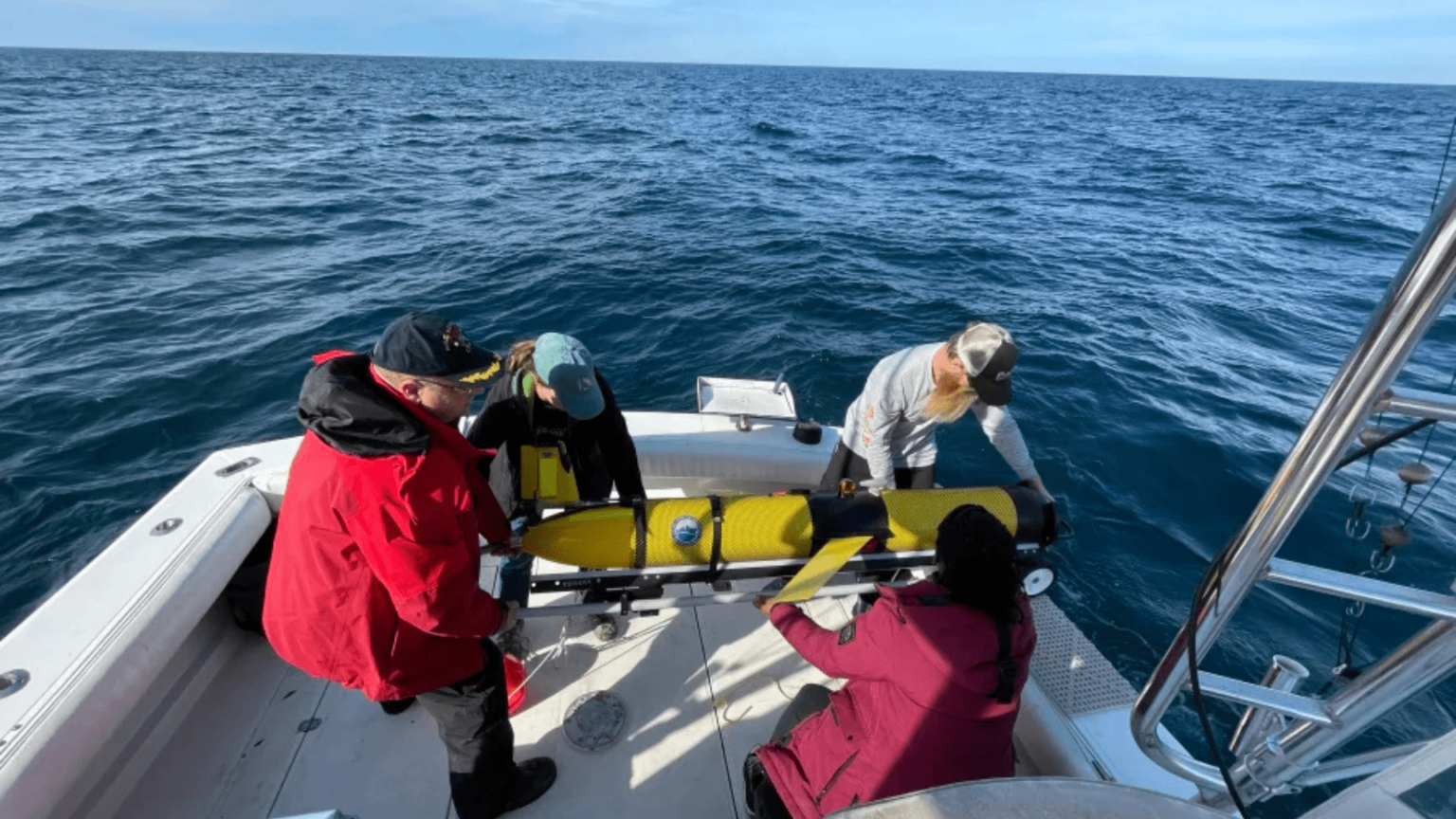Proper whales are among the most endangered whales on the planet. Solely about 370 North Atlantic proper whales stay. Scientists take to the air and sea to conduct whale surveys to identify some North Atlantic proper whales and new child calves. These surveys are crucial to figuring out and cataloging each new child proper whale. Nevertheless, the surveys within the sky and on the water are imperfect.

Scientists are ramping up the trouble to trace the whales otherwise, particularly within the Southeast, the place the whales would possibly migrate to present start this time of 12 months.
Listening for Whales
Catherine Edwards, a researcher on the College of Georgia’s Skidaway Institute of Oceanography, and her workforce use instruments to hear for underwater whales. Due to the winter climate, flying is proscribed. “Sadly, the climate in December, January, and February doesn’t all the time let flights occur,” she mentioned.
Edwards and her workforce use passive acoustic detection, which includes supersensitive microphones floating within the water, to hear for whale sounds. Edwards mentioned, “The largest success we had from final 12 months is now we have the very first confirmed passive acoustic detection of proper whales south of Cape Hatteras, North Carolina.”
Related expertise is used extensively within the north, however the shallower waters within the southeastern U.S. make it tough.
Defending Proper Whales


The Northern Atlantic proper whale has been listed as endangered since 1970. There was once 1000’s of the species. Nevertheless, within the nineteenth century, the whaling trade labeled them the “proper whales to hunt” as a result of they had been gradual and swam close to the floor. By the Thirties, when proper whale searching was banned, there have been solely about 100 left. In 2010, they bounced again to about 500 however dropped right down to round 370 since.
“We’re on the level the place the lack of a few animals might be the distinction between restoration and extinction,” mentioned College of South Carolina professor Erin Meyer-Gutbrod, working with Edwards to enhance acoustic monitoring within the South.
People are the principle killers of proper whales, in accordance with a report from NPR. A standard reason for demise or damage comes from the whales getting trapped in fishing nets. As well as, the whales are generally hit and killed by boats. Alerts exit to the boaters when a whale is noticed, however the present recognizing effort nonetheless misses whales.
Giant boats are restricted to a 10-knot, or 11 mph, pace in whale-sensitive areas. Nevertheless, research from the advocacy group Oceana present that many ships go too quick. Sadly, enforcement doesn’t occur in actual time. Delivery trade teams say that the pace restrict doesn’t work for smaller boats as a result of it’s harmful for them to go that gradual.
Meyer-Gutbrod hopes higher monitoring can persuade the smaller vessels to decelerate once they spot a whale voluntarily.
“As a lot as we wish to see a strengthening of those laws, we additionally want to extend effort into motivating increased compliance charges,” she mentioned.
!function(f,b,e,v,n,t,s){if(f.fbq)return;n=f.fbq=function(){n.callMethod?
n.callMethod.apply(n,arguments):n.queue.push(arguments)};if(!f._fbq)f._fbq=n;
n.push=n;n.loaded=!0;n.version=’2.0′;n.queue=[];t=b.createElement(e);t.async=!0;
t.src=v;s=b.getElementsByTagName(e)[0];s.parentNode.insertBefore(t,s)}(window,
document,’script’,’https://connect.facebook.net/en_US/fbevents.js?v=next’);
!function(f,b,e,v,n,t,s)
{if(f.fbq)return;n=f.fbq=function(){n.callMethod?
n.callMethod.apply(n,arguments):n.queue.push(arguments)};
if(!f._fbq)f._fbq=n;n.push=n;n.loaded=!0;n.version=’2.0′;
n.queue=[];t=b.createElement(e);t.async=!0;
t.src=v;s=b.getElementsByTagName(e)[0];
s.parentNode.insertBefore(t,s)}(window, document,’script’,
‘https://connect.facebook.net/en_US/fbevents.js’);
fbq(‘init’, ‘804985360314753’);
fbq(‘track’, ‘PageView’);
